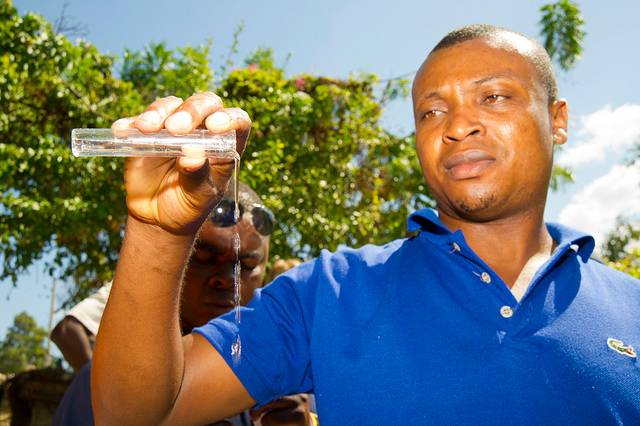At the small water point in Trianon, Haiti, a crowd gathers. Here, as at such sites across the country, locals wait their turn to fill buckets for drinking, washing and cooking – proving the adage that no matter where you are in the world, water is life. So when a deadly outbreak of cholera struck the island in 2010, the need for clean, safe water became paramount. “In Haiti alone, almost 8,000 people have died as a result of cholera,” said Kathy Middleton, M.P.H., associate director of extramural programs for the U.S. Centers for Disease Control and Prevention (CDC) in Haiti.
Providing safe drinking water is essential in reducing the risk of cholera and other waterborne diseases.
Due to poor water and sanitation and no prior immunity to the disease, cholera spread quickly. But with its healthcare and infrastructure in tatters following the quake, a response was difficult to coordinate. Recognizing the critical needs that existed, the Ministry of Public Health and Population (MSPP), the U.S. government and other donors stepped in, addressing the immediate health needs in the wake of the earthquake and supporting a nationwide effort to increase access to clean, safe drinking water. One of the first steps, says Middleton who manages CDC’s cholera response activities in Haiti, was to bolster Haiti’s National Directorate for Drinking Water and Sanitation, known by their French acronym as DINEPA.
“When DINEPA laid out their budget they came to us and asked if we could fund various positions for which funding had not been identified,” Tom Handzel, a CDC WASH epidemiologist said. “The idea was to cover the country with workers to monitor drinking water, and they would need two people per commune to do so.”
CDC is supporting salaries and commodities (including motorcycles for transportation) for 54 of the nation’s 256 Rural Water and Sanitation Technicians. These technicians were deployed by DINEPA to test chlorine levels at water points across Haiti. CDC also designed the training program for all 256 technicians and is currently providing assistance to design a robust information management system for monitoring the data the technicians will routinely collect. Aside from directly supporting the Technicians, CDC is also funding several small water projects in Haiti and provided a range of much-needed technical support as well.
By passing on their findings to Haiti’s government, DINEPA will help to inform future policy and emergency response, a critical need if further deadly outbreaks are to be avoided. “Over the longer term DINEPA intends to set up water committees at each water point who will be responsible for collecting fees for water collected. This will be used to maintain the water points and provide chemicals for water treatment.”
As Haiti moves on from the devastation of 2010, the gaps in public health that led to the cholera outbreak have been gradually closing. Having overseen CDC’s cholera response activities in Haiti, Middleton says there has been tremendous progress in the country’s readiness for the next emergency, a readiness that will no doubt save lives. CDC is supporting Haiti's cholera elimination strategy which includes a robust WASH plan.
“DINEPA is a relatively new agency as it was set up less than one year prior to the January 2010 earthquake,” Middleton said. “The organization has had some major challenges to deal with. However, they are moving in the right direction and have been a very good partner for CDC.”
